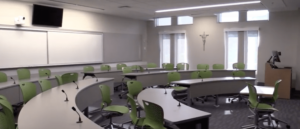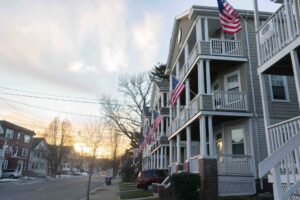Tag: Margaret Scales ’23
Providence College Needs a Communications Program: Students Interested in Journalism and Communications are Missing Out
by Andrea Traietti on February 27, 2020
Opinion

by Margaret Scales ’23
Opinion Staff
In such a politically trying time, with both the left and right critiquing ‘fake news,’ it feels like there is no better time to support communications and journalism programs in higher education. Although some may argue that journalism is a ‘dying industry,’ is that something that we as Americans should settle for? Providence College should implement a communications program for several reasons, but more than anything, because it is what the people want.
The motto of The Washington Post, one of the most renowned American media companies, states, “Democracy Dies in Darkness.” At its core, this statement poses a cry for help. Freedom of the press is one of our constitutional rights, so as institutions like PC fail to incorporate the media industry in their programs of study, they are in turn doing a disservice to our democracy. As Americans, we are incredibly privileged to have this freedom, so rather than accepting its death, upholding the journalism industry is something we should urgently pursue.
The claims that ‘journalism is dying’ and that ‘there is no money in communications,’ are self-fulfilling prophesies. By failing to offer communications and journalism programs, colleges and universities like PC are leading contributors to that cause.
When contacted about the lack of these programs at PC, Dr. Bruce Graver, the chair of the English department, emphasized that there has never been a communications or journalism program at PC. Additionally, he encouraged further research on employment and income risks for those considering a communications major.
On the topic of salaries—is money really all that matters? If so, what about the equally as historically low-paid education majors or dance majors, for example? What should matter is not only the importance of upholding the industry, as previously stated, but also attending to the interests of the students who pay on average over $50,000 each year to study at the College.
Low and behold, the interests of PC’s student body specifically reflect a devout interest in communications. At PC, a major in communications is one of the most popular student-created majors, along with environmental science. Students like Corrie Traverse ’20 among others have already taken on the “rigorous process”—according to Peter Palumbo, PC’s director of academic advising—of creating their own degrees in media/communications and are currently working towards earning them at the College right now.
As previously stated, students like Traverse are not alone in their interests in communications—students’ similarly strong desire for a program like this has in fact brought to the surface discussion of introducing a minor in communications at the College in the future. According to Palumbo, “the rumor is true. There is a communication minor in the works.”
Palumbo also stated, “The communications conversation has been going on for a while.” This begs the question of why? Not only will implementing this minor appeal to the desires of students, but it can subsequently bring in a lot more revenue to the College, further begging the necessity for PC to bring about this addition to the programs offered.
Small Student-Faculty Ratios: Beneficial or Not?
by Andrea Traietti on January 30, 2020
Opinion

by Margaret Scales ’23
Opinion Staff
College websites and advertisements often publicize their student-faculty ratios, flaunting how small their class settings are. Although these intimate environments are beneficial in theory, are they really what college students want?
At Providence College, the Development of Western Civilization program—better known as “Civ” amongst students and faculty at the College—is mandatory for all undergrads upon graduation. Civ consists of three intensive semesters of reading, writing, and discussion about important historical figures and events that effectively contributed to how western civilization has come to be today. These three semesters are followed by a semester-long colloquium, allowing students to apply what they have learned from Civ to a topic they are interested in.
During those first three semesters, Civ consists of two large lectures each week and one smaller seminar each week. Because Civ is a humanities course, discussion plays a huge role, but more so in seminar than lecture due to its far more intimate class setting, exemplifying where that beloved student-faculty ratio comes into play.
In contrast to its seemingly redeeming qualities, Brenna Fitzgerald ‘23 explains that she does “not find Civ lecture more stressful than other classes because participation is not mandatory.” This immense pressure on participating in the smaller, more intimate seminars as opposed to the more lenient lectures greatly contributes to why so many students like Fitzgerald prefer their lectures over their smaller classes.
Additionally, although attendance is not optional for any class, many students find that skipping their Civ lecture is far more feasible than other courses. Because the roster of students is so large, it is easy to get lost in the crowd, which is why there is less pressure to participate or even attend class.
Although these facets of lecture classes are very comforting to most students—overwhelmed with academics, sports, clubs, and a social life—they do beg the question: why take a class if you do not plan on going?
When it comes to Civ, every student must take the course, so enrollment really is not up for discussion. However, students still find the same stress of seminar in their other chosen courses despite their interest. When asked about her classes for the following day, Katie Sartor ‘23 states, “Tomorrow I have my Civ lecture and I have psych, but I’m more worried about psych. In Civ lecture I’ll take a quiz but it’s like five questions, it’s a quicker quiz.” Although Sartor chose to take her psychology class as it is not required in the core curriculum, she still finds more comfort in going to her Civ lecture because of its predictability.
However, this rule certainly does not stand true for every course. Surely, many kids prefer their Civ lectures over their more demanding seminars because naturally, not everyone is the biggest fan of the Civ program. It is a very demanding course revolving around large amounts of reading, writing, and discussing, so it is understandable that any given math major, for example, might not love the Civ program.
For example, Fitzgerald states, “I am a psychology major, so I find myself preferring those classes over other classes.” Although the content of one’s classes within their major might be preferable, they still come at the cost of containing smaller class sizes and therefore sometimes a more stressful environment.
Even though the benefits of being in a small classroom setting—getting to know your professors and peers better or being able to participate more, for example—seem superior in theory, is that really what students are looking for?
The increased stress in more personal environments and subsequently higher expectations is a big price to pay for more desirable course content. It seems common that students agree with Sartor’s perspective—when it comes down to it, the predictability and lack of pressure of Civ lecture can be a weight off students’ shoulders.
Securing a Spot on Eaton Street Too Soon? Students Should Take Caution Paying a Deposit Two or Three Years in Advance
by The Cowl Editor on November 21, 2019
Opinion

students put down deposits for them so far in advance. Nicholas Crenshaw ’20 / The Cowl.
by Margaret Scales ’23
Opinion Staff
Although deciding on an off-campus house for senior year as a sophomore is the norm here at Providence College, going against that deadline does not mean students are perpetually doomed. Many might agree that at first glance, putting down a deposit two years in advance seems crazy, so why are so many freshmen and sophmores already accelerating that process by making arrangements during their first semesters at PC?
Come their senior year, many students at the College decide to live on Eaton Street. In the off-campus neighborhood, there is an abundance of houses close together, each with New England-centric or PC-centric names. This coveted area is a dream for most underclassmen as it stands as a social hub on the weekends.
In addition to the exciting anticipation of living on Eaton Street, students are encouraged to put down their deposits on these houses during the first months of their sophomore year, cultivating a lot of stress amongst the buzz.
At PC, the norm of preparing to put this deposit down begs the question: how students are capable of predicting who their senior years friends will be two years in advance? Naturally, people evolve as they grow during their college years and meet new people.
In the second half of students’ four years at the college, it is easy to predict that social circles will change after putting that deposit down early on in sophomore year.
To bring this absurd reality to another level, it has become a common theme amongst the current freshman class, the class of 2023, to already begin planning out their senior year living situations. Given the difficulties that sophomores face when making this decision, it is absolutely ridiculous to imagine making this decision as a freshman who has only attended PC for a mere three months.
Not to discount the existence of many genuine friendships amongst freshmen, but there is something to be said about the prevalence of convenient friendships during the first semester of college. Most students who are thrown into this new environment struggle with making genuine friends and cling onto whoever they can. With this being said, how can someone possibly plan out their senior year living situation based on what may be a group of temporarily convenient friends?
To ease the stress of committing to living with a group of people who might not be a part of your life come senior year, it is important to realize that switching houses in the second half of life at PC is very common. Many students do in fact find different social circles as they grow and evolve here at PC and are able to switch spots with other students in other houses—although deposits are substantial, they do not render your future definitive.
Acknowledging the circumstances of transfer students is important—students who begin their lives at PC after the first semester of sophomore year want to live on Eaton Street too. Transfer students are a perfect example of why going against the norm of deciding on senior year housing at the beginning of sophomore year is not only okay but can also create some of the most ideal living situations.
For example, Jocelyn Fields ’21, who transferred to the college as a second semester-sophomore, states, “A group of six girls, who had chosen to live in a 10-person house, had four students choose to leave their house and asked myself and three other friends if we would be willing to sign on.” Occurrences like these are not out of the ordinary, proving it is possible to coordinate a successful senior year living situation after that first week of sophomore year.
Considering Fields’ house-hunting success as a transfer student, it is easy to say that it does in fact all seem to work out in the end in respect to figuring out senior year living. With this being said, do not worry about what happened at the start of sophomore year, let alone the first semester of freshman year—life on Eaton Street will come.
Tangents & Tirades
by The Cowl Editor on November 14, 2019
Opinion

Break Away from RateMyProfessors
With the season of choosing next semesters’ classes comes the raiding of ratemyprofessors.com, a website where students can get the inside scoop on their potential professors. Although the ability to access this information can be comforting, it can also take away from the experience of growing academically from the challenge of a difficult professor.
The obstacle of getting an ill-reputed teacher back in high school without the luxury of utilizing ratemyprofessors.com may have been an annoyance, but more often than not, those teachers were the ones who forced students to work harder, fostering better work ethics. By routinely relying on this luxury of finding the easiest professors in college, the benefits from being subject to the challenge of difficult teachers will fall flat.
With this being said, although a professor may have a 4.5 difficulty rating, that does not mean that he or she is going to ruin your college experience. Additionally, the reviews on the site are very subjective—who’s to say that the student writing the review is similar to you?
While everyone can agree that scouting the easiest work load possible for their coming semesters is comforting, the value in facing a challenging course load can be lost in that amenity. Rather, instead of focusing on enrolling in classes solely based on difficulty ratings or overall quantity of work, take a chance on someone with a higher difficulty rating—the challenge might just have a positive impact on you.
—Margaret Scales ’23

Time is Currency for Professors AND Students
Have you ever experienced a class that went over the time it was allotted? Most of Providence College’s campus has too.
This is a concept that can become quite aggravating, especially when it comes to professors that habitually partake in this practice. Many students arrange their schedules so that they are going to back-to-back classes, or working right after class.
Thus, when a professor goes even slightly over, these few minutes can make students go from barely being on time to immediately being late. If professors are going to enforce tardiness policies, they must in turn be sure to finish their classes on time, given that students will likely be penalized for being late to their next class.
If professors do anticipate going over given their passion for the course material, they should allow students to leave if they have somewhere pressing to be next.
There should be a mutual respect for other peoples’ time when it comes to the classroom—students should avoid at all costs being late to their classes, and professors should avoid going over the time allotted to their class. Time is a valuable currency to everyone—no matter their pay grade.
—Savannah Plaisted ’21
A Case for Dorm Life: Why PC’s Housing Policy Requiring Three Years of On-Campus Living is a Good Thing
by The Cowl Editor on November 7, 2019
Campus

by Margaret Scales ’23
Opinion Staff
In contrast to many other colleges and universities, Providence College requires their students to live on campus for their first three years at the College. Although this requirement fosters a good amount of negative criticism amongst the student body, its benefits outweigh the inconvenience of having to wait to share an apartment with friends.
At first glance, the idea of subscribing to dorm life for three years is quite the turn off—who wants to deal with roommates and communal bathrooms for three years? However, once stepping onto a campus that does not share that same obligation, it is clear that the pros of dorm life at PC outweigh the cons. At most other schools, as students are allowed the freedom of living off campus after their freshman year, these other campuses become emptier, losing that community feel that a greatly inhabited school like PC provides.
Dorm life—while testing at times—is very social, forcing even the shyest of students to interact with their neighbors and meet new people. Living only a door apart from dozens of other students is a great way to make friends and broaden your social circle. Although most schools require this experience for freshmen, the fact that PC students are subject to dorm life for three years builds even stronger relationships than those of other schools.
Because PC requires their students to live on campus, kids are far more apt to develop their social lives around that. Given that the College’s property is already small, the fact that the majority of the student body lives on campus fosters a lot of energy at the College. Whether it be on Slavin lawn, in the Peterson Recreation Center, or even in Raymond Dining Hall, there is always an abundance of events happening, something that would not be made possible without the large community presence on campus.
As the multitude of student-run events and activities at PC can certainly consume someone’s day, the night life similarly often revolves around being on campus. Because so many students live on the property, dorm-party culture is far more popular at the College than at other schools, something that the student-on-a-budget should certainly be grateful for. While there are many popular bars in the area, more often than not, PC students can be found having just as much fun spending their nights in dorms.
The night life at many other inner city colleges and universities seems to be far more dependent on breaking the bank in order to have a good time. Between Ubers, dinners, and bars, students at other institutions often spend over $100 each time they want to socialize with their friends. The advantages of staying on a campus with such a strong community and inherently strong localized night-life more than outweighs the obligation of going into debt in order to have a social life.
Lastly, the glorious tradition surrounding moving off campus for your final year at PC is something that every student is able to look forward to. The idea of senior privileges is diminishing as higher education becomes more independent and individualized, but not at PC. After forming incredibly strong relationships throughout every student’s three years of dorm life, finally being able to get a house together for senior year is all the more special. There is also something to be said about the fact that senior housing lines campus—students just cannot get enough of that Friartown community.
Tangents & Tirades
by The Cowl Editor on October 3, 2019
Opinion
Intramurals to Club: Where is the Middle Ground?
Looking to get more involved on campus in the excitement of the new school year? Maybe pick up a sport you dropped after high school? Students are often encouraged to join club or intramural teams, but it is not that simple.
The gap between club and intramural sports here at Providence College is keeping both the experienced from playing at a competitive level and the inexperienced from trying something new without risking injury.
Committing to playing a club sport includes tryouts, off-season training, weekly traveling to compete against other schools, and national tournaments. PC has even recruited high school athletes for their club programs. As club sports reflect the characteristics of Division I athletics more and more, I cannot help but be skeptical of the level down, intramurals.
In contrast, intramural teams are formed based on sign-ups and are granted only a handful of games in the span of their short-lived seasons. Perfect for the freshman who is looking to try something new, but not for the four-season-high-school-varsity-athlete who would rather spend weekends with their friends than travel hours for away games.
How will this gap be bridged? It seems out of reach for the former high school athlete to continue their hobby without sacrificing all of their time as this gap between intramurals and club sports widens. For me, I’ll stick with The Cowl.
—Margaret Scales ’23

SodexNo
Providence College’s dining service, Sodexo, has taken a lot of heat lately. People simply do not like the food and have issues with its variety. There is no shortage of complaints on campus about PC’s food options and its quality. Aside from all this, one thing is clear: Sodexo is not a reliable nor healthy food service.
First off, the menus posted online are not always true to what is actually being served. Many students claim they have gone to Raymond Dining Hall on a particular day due to the meal advertised on the menu. Upon arrival, they realize Ray is definitely not serving what they claimed. Simultaneously, they lose a meal swipe, and their appetite.
Secondly, healthy options are sparse in both Alumni and Ray unless you would like to pay. True, there is the salad bar in Ray; however, a healthy, balanced, and quality meal expands far beyond “leaves, seeds, and twigs,” as my friends lovingly refer to the protein-deficient salads they eat daily. Plus, the Alumni salad bar, which is hardly better in content, requires Friarbucks or real money. Ultimately, serving high-carb, unhealthy meals such as burgers, pizza, and chicken patties does not make sense.
Considering the knowledgeable and health-conscience society we live in, as well as our tuition, the dining services here are a mystery.
—Olivia Bretzman ’22

